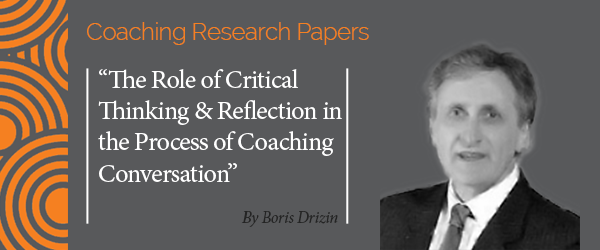
A Coaching Power Tool created by Boris Drizin
(Executive, Business, Leadership Coaching, BRAZIL)
Introduction
The objective of this paper is to research “The Role of Critical Thinking and Reflection in the Process of Coaching Conversation.” First, we shall review the concepts and purpose of Coaching Conversation, Reflection and Critical Thinking. Then we shall investigate how critical reflection helps the Coach achieve the purpose of coaching conversation. And how can the Coach help the Client upgrade his thinking using Critical Reflection Questions.
The concepts, purpose and process of Coaching Conversation
First, some preliminary definitions of the key words of the phenomena and processes being analysed in this section: (1) Coaching; (2) Conversation; (3) Coaching Conversation;
Coaching
The words coach and coaching are used to mean so many different things that it is essential to define first what we are talking about. As Frances Hesselbein gently warns us: “Listen very carefully when people talk about coaching. It must be said that not everyone is talking about the same thing.” (Hesselbein, Frances) The International Coaching Federation (ICF) defines coaching as partnering with clients in a thought-provoking and creative process that inspires them to maximize their personal and professional potential. The coach’s responsibility is to:
The coach’s job is to provide support to enhance the skills, resources, and creativity that the client already has. (Source: International Coach Federation – ICF Website -Coaching FAQs – 6/23/2011)
Coaching is unlocking a person’s potential to maximize their own performance. It is helping them to learn rather than teaching them – Whitmore
This definition is based on Timothy Gallwey’s claim that “if a coach can help a player to remove or reduce the internal obstacles to their performance, an unexpected natural ability will flow forth without the need for much technical input from the coach.” (Whitmore)
Coaching is fundamentally about helping people fulfill their potential by allowing them to recognize the things that hold them back and by helping them discover ways around them. It is at the level of potential then that our detailed examination must start. – Somers
In short, “the aim of executive or life coaching is sustained cognitive, emotional, and behavioral changes that facilitate goal attainment and performance enhancement, either in one’s work or in one’s personal life” (Douglas & McCauley, apud Stober & Grant)
Conversation
The word Conversation derives from latin “con verter”, meaning “turn around” – two people turning around to each other to see each other, and to talk to each other face to face, exchanging news, feelings and thoughts. A healthy and productive conversation becomes a Dialogue, a term that was first used by Martin Buber in 1914 “to describe a mode of exchange among human beings in which there is a true turning to one another, and a full appreciation of another, not as an object in a social function, but as a genuine being”. As the physicist David Bohm conceived it, dialogue would kindle a new mode of paying attention, to perceive the assumptions taken for granted, the polarization of opinions, the rules for acceptable and unacceptable conversation, and the methods for managing differences.” (Senge, Peter et al.) William Isaacs defines Dialogue as the art of thinking and acting together. “Dialogue, as I define it here, is about a shared inquiry, a way of thinking and reflecting together. Dialogue is a living experience of inquiry within and between people. (…) The intention of dialogue is to reach new understanding and, in doing so, to form a totally new basis from which to think and act.” In sum Dialogue is a powerful way to achieve deeper meaning and understanding. (Isaacs,William)
Coaching Conversation
Coaching Conversation is a conversation in the context of a coaching process. It is a conversation between the Client and the Coach. In light of our above definition of dialogue, we can call Coaching Conversation as being a Coaching Dialogue. Coaching is a purposeful conversation, a conversation with an intention. According to the ICF the purpose of a Coaching conversation is to “help people improve their performances and enhance the quality of their lives.” The intention of the Coach during the Coaching Conversation is to have the Client leave the conversation feeling freed up, with more hope, more confident in himself and in his competence, with more creative ideas, with a clearer view on possibilities and empowered to act. Michel Renaud translates this spirit and intention wonderfully: “I don’t listen from the point of view that people need my answers, advice, or infinite wisdom. My point of view is that people possess within themselves the ability to resolve their upsets, do their own thinking, discover their own answers and the path forward. If I listen from that commitment, it’s just magical.” (in Hargrove, Robert. “Masterful Coaching”) The centerpiece of the coaching process is the coaching conversation, where 80% of the airtime is with the Client.